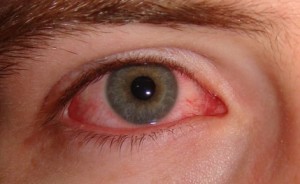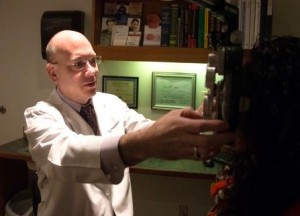The surface of the eye is one of the areas of the human body most susceptible to environmental allergies and early Spring is one of the peak allergy seasons. Often, when we see a patient who comes in believing (understandably) that they have an eye infection we find the true culprit to be an ocular allergy. Since a true infectious, bacterial conjunctivitis and an allergic conjunctivitis both result in significant redness and discharge from the eye they can be easily confused. However, there are symptoms and findings which can help differentiate these entities; usually allergies will have:
- prominent itching, infections less so,
- discharge in an allergy is more likely to be clear and less thick than the colored, thicker discharge seen in an infection.
There are also several different appearances to the eye that your doctor may notice via careful examination of your eyes with a microscope. Seasonal allergic conjunctivitis affects about 20% of the U.S. population.
Why is the eye so reactive? The ocular surface contains over 50 million mast cells, these cells are the body’s early warning system and once they are activated by something you are allergic to they release a cascade of chemicals including histamines, which are responsible for most allergic symptoms.
Treatment for the ocular symptoms of seasonal allergies can involve the use of prescription eye drops and cold compresses. If you use oral allergy medications you should continue to use those as well. We also recommend monitoring air quality, trying to avoid extensive periods outdoors and keeping windows shut when the air quality is particularly poor. As a service to our patients we have added a link to this air quality index tool from Weatherbug.com to assist you in monitoring air quality.
Even while we enjoy the warmer weather and blooms of Spring we understand that, for many, this is a season that also brings with it some discomfort. At our four Chicago Eye Doctors at Pearle Vision eye care centers (Lincoln Park / DePaul, Old Town, Six Corners/Portage Park and Melrose Park) we are ready to help with the wide variety of eye care challenges our patients face.






